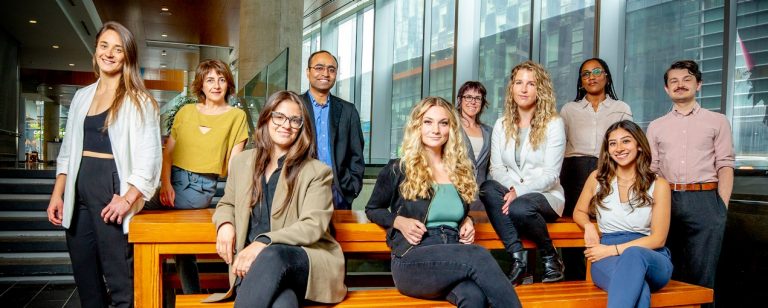Concordia introduces its newest Public Scholars

Concordia is unveiling its newest cohort of 10 Public Scholars, a distinguished selection of top doctoral students who are poised to captivate the public’s attention with their innovative research.
This diverse group of graduate researchers is tackling everything from using MRI (magnetic resonance imaging) for the early detection of cerebral health decline to studying the impact of environmental and physical conditions on Japanese macaques.
“We are thrilled to introduce our newest Public Scholars to the world,” says Faye Diamantoudi, dean of graduate studies.
“These exceptional scholars were chosen from among our most accomplished doctoral students and have been entrusted with the mission to engage and share their innovative research with the wider public.”
Each year, Concordia selects 10 PhD students to represent the university’s interdisciplinary diversity and excellence in research. The scholars engage with the broader community to share the significance of their work and its impact on society.
Launched in 2016 in partnership with the Montreal Gazette, last year the program expanded its media partnerships to include Le Devoir and The Conversation.
The 2023-24 cohort will spend the next year writing op-eds, hosting live events, connecting through social media, engaging with the media and much more.
The 2023-24 Concordia Public Scholars
Azfar Adib, electrical and computer engineering
How we can ensure both privacy and accuracy during age-verification, especially to safeguard children?
Paula Bath, sociology and anthropology
How does communication echo and resonate across deaf and hearing experiences?
Dalia Elsayed, education
How do race, gender, class and other categories of identity and oppression impact Black women’s experiences in academic spaces?
Maxine Iannuccilli, psychology
How do we acquire gender stereotypes?
Vanessa Mardirossian, Individualized (INDI) program
How can a biomimetic approach to textile design contribute to the conception of non-toxic and sustainable dyes?
Amy Mazowita, communication studies
How are individuals using social media–based mental-health comics as resources for self- and collective care?
Laura Domínguez Mercado, chemistry and biochemistry
How can we slow down the evolution of antibiotic resistance?
Jacob Pitre, film and moving image studies
How do tech companies seek to control how we imagine the future?
Brogan Stewart, geography, planning and environment
How can Japanese macaque behaviour inform our understanding of whether a monkey is stressed by its physical circumstance — e.g., physical impairment, injury — and environmental context — e.g., captive, free-ranging or wild?
Stéfanie Tremblay, physics
Can we use advanced brain MRI techniques for early detection of declining cerebral health?
Learn more about Concordia's 2023-24 Public Scholars.




